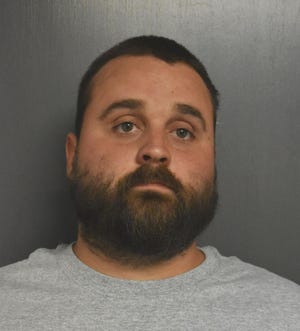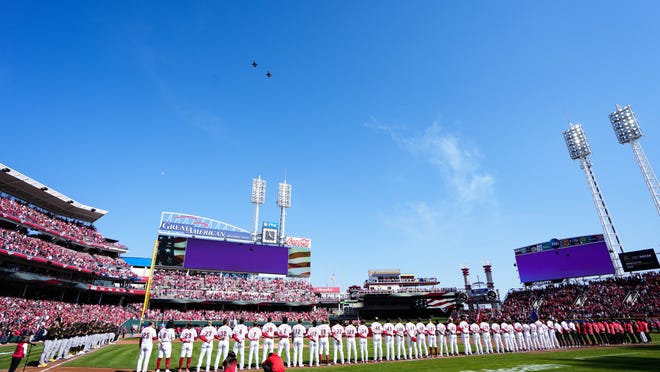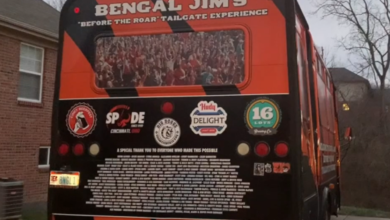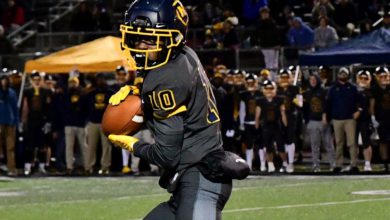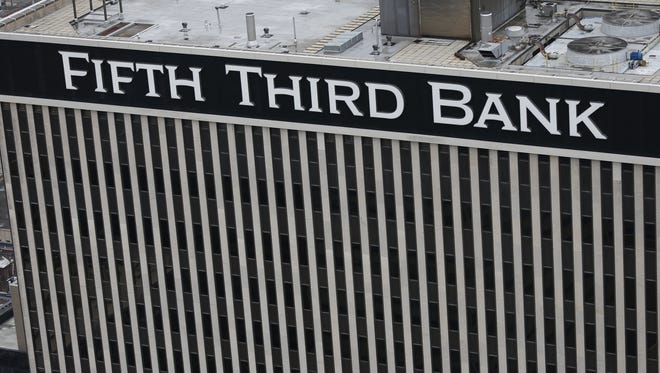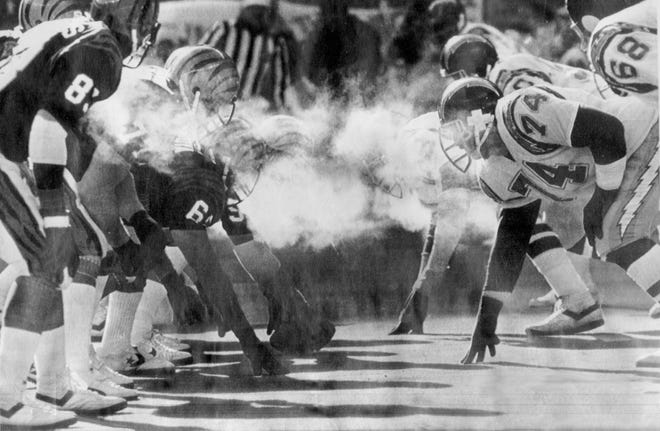

For 100 years, Cincinnati has been synonymous with its iconic take on Macedonian-inspired chili.
The dish was dubbed Cincinnati Chili, a name that lives on today.
But on one fateful day, 40 years ago Monday to be exact, the city became famous not for serving chili, but for simply being chilly. Add in a football championship and that legend lives on just as strong.
The Freezer Bowl, as it became known years later, was more than just an opportunity for the Bengals to breakthrough and earn the franchise's first Super Bowl trip. But rather was a defining moment for the team and the city of grit, those who experienced it recalled in interviews with The Enquirer last week.
Led by head coach Forrest Gregg, a tough-nosed leader, who himself played in freezing temperatures during the in 1967 Ice Bowl as a Green Bay Packer, the Bengals took the field for the 1981 AFC Championship confident they would win the mental game and ultimately win the game itself.
The Chargers, led by quarterback Dan Fouts, now a Hall-of-Famer, were loaded on offense however and ready to claim their own NFL lore. It made for a perfect collision course. But before the teams could collide, they had to figure out how they would overcome their first battle of the day: Mother Nature.
These are their stories.

Not 'all that bad'
When quarterback Ken Anderson and the Bengals stepped into Riverfront Stadium on Saturday, Jan. 9, 1982, for one last practice ahead of the AFC Championship, the league's Most Valuable Player that year didn't feel anything out of the ordinary.
"It wasn't all that bad," he recalled of the weather that day, which had a mean average of 22 degrees with the lowest temperature hitting seven degrees Fahrenheit according to almanac.com.
When Anderson woke up the next day, however, things had changed.
Spurred by a low-pressure storm off Canada's Hudson Bay, Cincinnati had developed a temperature of minus nine degrees by kickoff. And with a wind chill factor of minus 59 (computed at the time), the Bengals were about to play the coldest game in NFL history.
"I remember waking up Sunday morning, I always woke up early and had a cup of coffee and read the paper before a pre-game meal," Anderson said. "And I opened up the door of the hotel to check the temperature and it hit me and I thought 'Oh my god, what the hell happened?'"

Though the weather came as an unwelcoming surprise to players, coaches and fans, there was still football to be played and a Super Bowl berth to be decided. Anderson said he heard talk before the game about a postponement. Chargers owner Gene Klein even approached Bengals assistant general manager Mike Brown urging him to postpone the game before it started. But with a forecast much of the same in the coming days, the show went on. The game would be played. It was time to prepare. Ready or not, the Bengals took the field.
"You're just trying to figure things out," Anderson said. "You know it's 'Can I grip the ball?' Back in those days, there were no hand warmers and the thermal equipment wasn't quite as good as it is today. So the first thing you're doing is figuring out what to wear."

The Bengals locker room before the game was a scene out of a prop comedy routine. Players scrambled to figure out what to wear under their pads trying anything that would provide any kind of comfort to the grueling conditions. Anderson had to be careful with his layers as to not restrict his throwing, he said. He came up with a happy medium.
"I wore long underwear atop a t-shirt and that was it and then I had long underwear bottoms and I cut those off at the knee so it wouldn't restrict me," he said. "But guys were trying on a number of different things. Somebody brought pantyhose down and I guess there weren't many of those that fit players."
The Bengals' offensive line elected not to wear sleeves, instead rubbing Vaseline down their arms, as a mere practical matter so the defensive line couldn't grab onto their sleeves. Lineman Dave Lapham came up with the idea. It was also a mind game for their opponent.
Not wanting to be one-upped, cornerback Ken Riley convinced the defensive lineman to do the same, calling it a "psyche game."
"He's definitely competitive, he was definitely a competitor," the late Riley's son Ken Riley II said of his father. "I could see him saying that that would be a mental edge over the opponent, especially since they're already cold and coming in from the West Coast. Just for them to say like 'These guys are crazy, they don't feel it.'"
Game time
The Chargers had just played in Miami the week before and there was no question who had the advantage to a cold kickoff.
"We play in the north and they don't," Anderson said.
The Bengals had weapons of their own on offense. Anderson was protected by future hall-of-famer Anthony Munoz, running back Pete Johnson was a pro-bowl receiver and rookie sensation Cris Collinsworth led all rookies in receiving yards while earning a pro bowl berth in his first season.
Despite what would be an unusual game day temperature for the team from San Diego, Fouts said the Chargers were ready to earn a Super Bowl berth and there were no excuses about the weather.
"Everybody knew it was cold and we knew it was really windy," he said. "But we were ready to play, we had had a good week of practice. We knew the Bengals, they knew us."

The game kicked off and despite winning the toss, the Bengals elected to have the cold wind at their backs rather than receive. The Chargers began both halves with the ball as a result.
The strategy worked for Cincinnati however. The Chargers struggled to move the ball amid the heavy winds. After Jim Breech hit a 31-yard field goal in the first quarter, Anderson hit M.L Harris for an eight-yard touchdown to give the Bengals a 10-0 lead.
"It was very windy and the configuration of the stadium made it swirl a lot," Fouts said.
While Fouts, who led a high-powered offense that featured other future hall-of-famers Charlie Joiner and Kellen Winslow, struggled to get momentum going early on, Anderson found ways to move the ball in the gripping cold.

"Lindy Infante was our offensive coordinator and did a great job that game," Anderson said. "If you noticed, most of our passes that we threw were between the hashmarks because you could kind of control it a bit more rather than throwing it out to the flat."
Fouts hit Winslow for a 33-yard score in the second quarter, but that was all the Chargers would muster that day and the Bengals won 27-7 to earn a berth to the Super Bowl.
Johnson scored from one-yard out in the third quarter before another Breech field goal and a three-yard pass from Anderson to Don Bass rounded out the scoring.
Anderson finished 14-for-22 for 161 yards and two touchdowns. Fouts went 15-for-28 for 185 yards with one touchdown and two interceptions.
Asked if the result would have been different had the game been played in milder weather, Fouts said the game was decided that day adding that a hypothetical game in a different location will never be played.

"They beat us, they played better. Kenny was awesome," Fouts said. "You know you could say 'Oh yeah we would have beat them in San Diego,' but you know you don't know that. They were a great team."
Managing the freeze
While the Bengals seemed to be in complete control of the game despite the freezing temperatures, there are a few stories that shed light on the totality of what it was like playing in sub zero conditions.

Seeking to get an edge by warming up, defensive end Eddie Edwards put a warmer up to his ear during the game but before he knew it, his ear was literally frying in real time. His teammates recalled seeing smoked billowing off of his ear.
Anderson had a run in with the unique conditions as well. Sitting on heated benches the NFL brought in from Philadelphia, the quarterback was sitting on his hands with his feet down below in the bench's slots. A staffer put a warming cape over him, and when a loud roar occurred at the stadium, he tried to get up quickly.
"I'm standing up to see if there's a turnover and I'm going back onto the field, and my feet don't come out of those slots, and I go down," he said. "The first thing that hits is my facemask and I'm seeing stars."
It was the first quarter. Anderson said he called for a trainer for smelling salts.
"I said I can't get knocked out of the AFC Championship game falling off of the bench," Anderson said.
While Bengals players had to brave the conditions, the city, eager to cheer its team on to make history, also braved the weather. More than 46,000 people attended the game, some of whom, did so shirtless.

"It was amazing," Anderson said. "...How the fans survived that day, I don't know."
Seated in a box provided by the city, David Mann, Cincinnati's mayor at the time, remembers the entire city rallying around the Bengals that day. He said he remembers the Freezer Bowl "like it was yesterday."
"The box was normally heated, but it wasn't that day, the system was overwhelmed," Mann said. "I don't recall ever being so cold in my life, but because of the excitement of the game, it didn't matter."
The game had an impact on many fans who didn't make the game as well. As a young 11-year-old boy, Jim Foster had just began showing an interest in watching the Bengals during the 1981 season.

"My mom and dad weren't really football folks," Foster recalled. "My very first football game I ever watched just happened to be me turning on the TV that year when they played the Seattle Seahawks in the very first game of the year."
"I haven't missed a game since," he added.
The boy who later became "Bengal Jim," the team's 2021 Fan of the Year nominee, had found a new lifelong passion that year. The Freezer Bowl will always stand out among his memories as a Bengals fan.
"I remember my dad couldn't go to work that day because none of the cars would start," Foster said. "I remember all the stories of people that somehow made it down to the stadium because no buses were running, cars wouldn't start, so people were just having a hell of a time getting down to the stadium."
Cold aftermath
Fouts still feels the effects of the Freezer Bowl to this day.
"Frostbite never goes away," he said. "I've got it on my fingers and toes, my hands and feet basically."
"Kenny (Anderson) and I have talked about it over the years, I think we were the only two guys without gloves on and we paid for it," Fouts added.
But it's the result of the game, not the pomp and circumstance around the unique conditions of the game, that haunts Fouts – who answered the phone by joking that the Freezer Bowl is one of his 'Favorite things to talk about' – to this day.
"It's the AFC championship game," he said. "I just wish I would have played better."
The Bengals lost the Super Bowl two weeks later to the San Francisco 49ers at the Pontiac Silverdome in Michigan, 26-21.
The immediate aftermath of the Freezer Bowl was tough to overcome while preparing for the big game, Anderson said.

"One thing that people don't talk about is we had a week before we got up to Pontiac and we stayed in Cincinnati for that week and the weather was just as bad," Anderson said. "So now you're trying to practice and you go out and now you don't have heated benches and you don't have heaters, and we may not have gotten as much work done as we would have liked to on the field because of those conditions."
The Bengals have never won a Super Bowl, and until that happens the Freezer Bowl continued to live in infamy for former players, the organization, and its fanbase.
"To say that we played in that game and we survived it and played well and we won, I think that's quite an accomplishment," Anderson said.
The buzz of the city as the Bengals made a Super Bowl run during the 1981 season is something Foster will never forget. And as the Bengals, who recently clinched the AFC North, prepare for the playoffs, Foster hopes to see reminiscent energy of the 1981 season.
Same energy with a little warmer temperatures, that is.
"I just hope that someday all the young folks get to experience what I experienced when I was 11 years old," he said. "This city during a Super Bowl run, a playoff run. The energy and excitement, I have never experienced anything like it."
Source link

